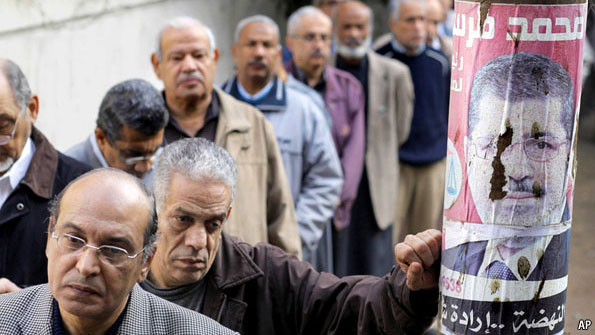推薦閱讀方法:首先快速閱讀全文,掌握文章大意,提高閱讀速度;再進行精讀訓(xùn)練,學(xué)習(xí)其中的詞匯和語言的用法。
雅思閱讀精選:背道而馳(From:The Economist)
Egypt’s referendum
Going the wrong way
Muhammad Morsi must accommodate the secular opposition; if necessary, the West should push him

IT LOOKS pretty certain that the constitution which Muhammad Morsi, Egypt’s president, has presented to the people will win their endorsement in a referendum that is being held in two stages (seearticle). On December 15th a majority of voters in the ten provinces polled said yes, though 57% of Cairo’s 6m voters said no. On December 22nd the remaining voters, who are likely to be more conservative, will probably grant their approval, too. Mr Morsi and his Muslim Brotherhood party may conclude they have a mandate to guide Egypt in an Islamist direction, away from more open, permissive ways.
They would be wrong to do so. This line of thinking threatens to plunge Egypt into a protracted period of impoverishing instability, which in the end will hurt Islamists as much as everyone else. The more pragmatic Islamists, perhaps including Mr Morsi, should change course while they still have time.
Even if the constitution gets popular approval, it will not have a ringing endorsement. Less than one-third of eligible voters are reckoned to have turned out in the first round of the referendum, and the margin of assent has been slim. Coptic Christians, who make up about a tenth of Egypt’s 85m people, are unnerved by the document’s Islamist flavour, as are many Egyptians with secular, liberal or left-wing views. And despite the referendum results, the Brothers may be losing favour. Since winning a clear plurality in a general election nearly a year ago, their popularity has been dipping.
Hardline Brothers may be tempted to respond by gripping onto power even more tightly. But the organisation that suffered so many decades of persecution under President Hosni Mubarak should surely realise where that may lead. Instead, Mr Morsi and his allies would do better to respect alternative opinions and stop treating political opponents as mortal enemies conspiring with godless Westerners to do them down.
Time to leave the streets
As a conciliatory gesture, Mr Morsi could use his powers of appointment to ensure that parliament’s upper house, the Shura Council, becomes more representative. Elected with only 10% of the vote, when it was widely assumed to be a mere talking shop that would be abolished by the new constitution, 83% of its members are Islamists, a far higher proportion than they would win in a fair election today. Given that the Shura Council will now be the sole legislature until fresh elections to the lower house take place in two months’ time, it would be wise to bring in more secular sorts and Christians. The Shura Council should also amend the new constitution’s most blatantly sectarian and anti-democratic clauses—such as the ones allowing the religious establishment to meddle in legislation and giving the army exorbitant political and budgetary perks.
The opposition, for its part, should start relying more on negotiation and less on demonstration. Street protests were a force for good before democracy prevailed—they toppled Mr Mubarak, after all—but if they become a routine way to change the law and remove governments, then Egypt will never learn how to reconcile interests and settle disputes through everyday politics. The non-Islamist opposition, which is coming together for the first time in a broad front, should concentrate on preparing for the imminent general election. To compete with Islamists at a local level, they must start tackling the urgent bread-and-butter concerns of poor people.
The West has rightly stayed out of Egyptian politics. But, once written, a constitution is hard to change back, so outsiders should now voice their anxieties about the direction Mr Morsi is taking. Germany’s government was right recently to postpone a dollop of aid until Mr Morsi shows a greater willingness to pass the test of real democracy. The Americans, who hand over $1.6 billion a year, should do the same.
At the start of the Arab spring, optimists hoped that liberal democracy would sweep the region and pessimists predicted that Islamists would grasp power and keep hold of it. Recent events have taken Egypt a step in the pessimists’ direction. But the old system failed, in the end, because oppressive governments that ignore their people’s views risk getting violently overthrown. It is not too late for Mr Morsi to show he has learned that lesson.
(參考譯文見下一頁)











